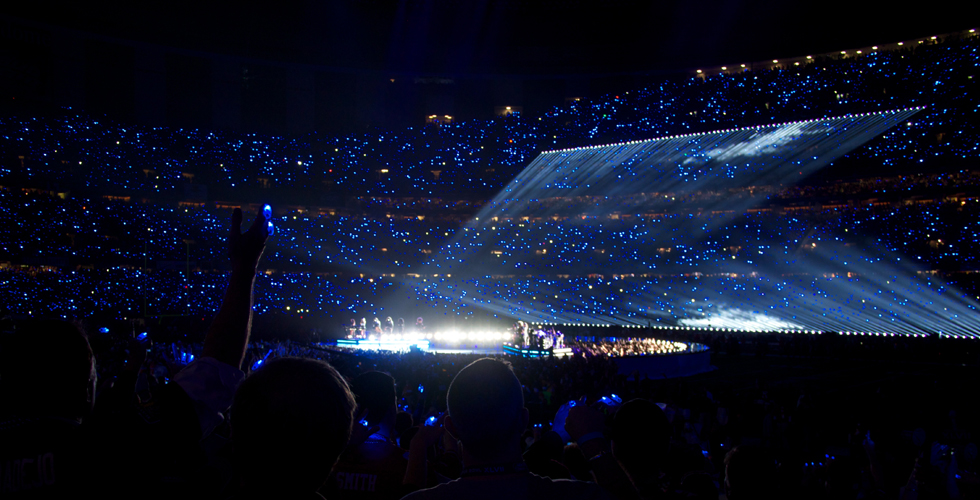Field Goal Kickers: Are They All Super-Similar?

(Inside Science) -- Sunday, Feb. 3, the San Francisco 49ers and the Baltimore Ravens will face off in Super Bowl XLVII. Most oddsmakers currently list the 49ers as a 3- or 4-point favorite, which may indicate that the two teams are in for a close game. The difference in the game may come down to one team's last second field goal attempt. This is where mathematical analysis shows just how fine a line there can be between winning and losing the biggest football game of the year.
The 49ers kicker David Akers is a veteran, who first kicked in an NFL game in the 1998 season. Justin Tucker of the Ravens is a rookie. During the 1998 season, he turned nine years old. Akers missed 13 field goal attempts this season, but also made a record-long 63 yarder. He made 2-6 from 50 yards or more. Tucker missed only three field goals this season, and made all four of his attempts from 50 or more yards. But last year, Akers made 7-9 from 50 yards or more.
Akers has had a tumultuous year -- full of ups, downs, injuries, and even threats. Please read this New York Times story for more details.
Would the 49ers be an even greater favorite if they had a different kicker-- a generic, average-performing NFL starting kicker? Does Tucker's track record bode well for the Ravens if they can keep the game close?
Well, it turns out the answer to both questions is probably no. That's my own take, building from research done by the College of Wooster's R. Drew Pasteur, a mathematician, and his student Kyle Cunningham-Rhoads. The work was presented last month at a meeting of two U.S. mathematical societies.
The new research shows that there's not much difference between the kickers who land spots with NFL teams. Pasteur says that the difference between the best and worst kicker in the league is relatively minor. So, given that Akers is a well-established, professional kicker, he's probably a good bet to perform adequately in the Super Bowl.
Akers may make or miss an important field goal, but the research suggests that the 49ers wouldn't be very likely to do better if they replaced him.
The researchers collected data on every field goal from the regular season and playoffs from the 2008, 2009 and 2010 seasons. For each of the 3,000 field goal attempts, they also gathered data on location, game situation and score, type of stadium, weather conditions, altitude and humidity.
They then analyzed the data for trends.
Pasteur and Cunningham-Rhoads found evidence that many factors influence field goal performance, including temperature, altitude, wind, and whether the stadium is open to the air, or a closed dome.
"Distance was the biggest effect, but after that it gets a lot murkier," said Pasteur. He added that "beyond 45 yards it's significantly easier to kick indoors, overall."
The researchers did some mathematical modeling to test predictions, and found that another significant factor was whether the game took place in the regular season, or the playoffs.
"Field goals in the playoff, both inside and out, seemed to be about 5 yards longer in terms of difficulty," said Pasteur. "We're not quite sure of what the significance of this finding was, that perhaps the defenses are better."
Those are all interesting findings and enable teams and fans to quantify hunches they might have always felt were true. But, Pasteur and Cunningham-Rhoads also found very little evidence that any kickers could be considered above average.
"It was surprising to see that kickers that did well one year and kickers that did well the next year were not correlated," said Pasteur.
The researchers made this conclusion by computing the probability that an average-performing, generic NFL kicker would make a given field goal, given the weather and other associated variables. By doing that for each of a kicker's real attempts, they could compare his real performance to that of this generic kicker.
Out of 36 kickers from 2008-2010, only one performed significantly above average: Tennessee's Rob Bironas, said Pasteur. He was 5 percent better than average. However, Pasteur indicated that this didn't actually mean that Bironas was actually the best kicker in the league.
Here's Pasteur's extended explanation: "If we do statistical testing on those results… We say what's the probability somebody would have done that well just due to good luck, over the number of attempts they have? Often it's typical to say we don't consider something significant unless the chance that this would happen just due to random effects is under 5 percent. The only one of those kickers that's significantly above average in this 5 percent randomness level is Bironas. Out of 36 kickers, only one of them really outperformed our standard expectations… You'd expect one or two to do that anyway, just based on random effects. Our model didn't find a whole lot of evidence to say, at least based on 3 seasons, that one kicker is really better than another."
There could be a few things at work here. One is that the analysis is somehow incomplete or didn't look at enough attempts to make statistically significant conclusions. The other is that random effects could be very important in football -- a sport that has just 16 games a year. Kickers don't try more than two or three field goals per game. The bottom line is that luck and randomness may be very significant.
In other words, even though Tucker performed better than Akers this year, he might not be a better kicker. Maybe he was lucky. If the same field goals were attempted over and over again by the same kicker, the results could be much different. One thing both kickers can take solace in is that New Orleans, with its indoor Superdome, hosts the big game this year. This will limit the influence of temperature, wind and other factors.
For future research, Pasteur is hoping to examine the influence of two other factors: the defense and the quality of performance of the long-snapper and the holder, who prepare the ball for the kicker.

